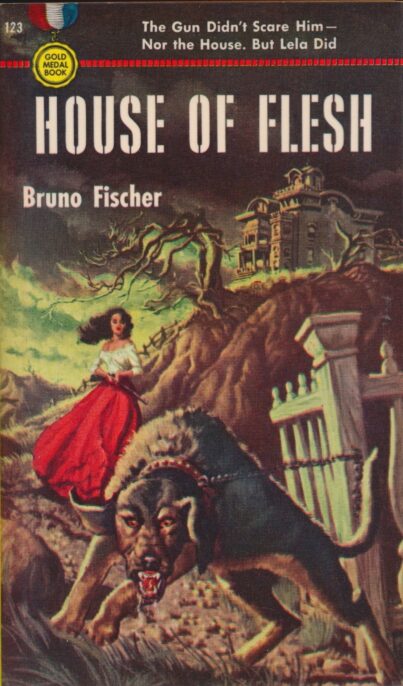 By BRUNO FISCHER (Fawcett Gold Medal; 1950)
By BRUNO FISCHER (Fawcett Gold Medal; 1950)
Yet another novel that was considered quite the shocker when it was initially published. Said publication occurred back in 1950, so I think it goes without saying that HOUSE OF FLESH is no longer much of an eyebrow-raiser. This means the story and characters now have to stand on their own without the surprise and shock value that made the book’s reputation, which is a mighty tall order for a 70-plus year old pulp novel.
Bruno Fischer (1908-92), a.k.a. Russell Gray, was a prolific pulpmeister in his day, with HOUSE OF FLESH being his best known, and most notorious, work. In its pages Fischer does what his contemporaries Jim Thompson and Fredrick Brown were known for: taking a fairly straightforward mystery narrative and twisting it to overtly macabre ends, making it difficult to discern precisely where the mystery ends and the horror begins (and vice-versa). In this sense HOUSE OF FLESH ranks with Thompson masterworks like THE KILLER INSIDE ME and A HELL OF A WOMAN, and Brown’s HERE COMES A CANDLE and THE FAR CRY, in content, though not quality. Those novels, after all, have endured, while HOUSE OF FLESH has not.
Harry, whose first-person recollections dominate the book, is a pro basketball player with a suitably hard-boiled outlook. He’s holed up in an upstate New York cottage for a summer sojourn, with his aim being relaxation. That of course is not how things work out, as Harry’s ex-wife Gale is still in the picture, as are a bevy of odd supporting characters, among them an elderly retiree who spends his days painting nude women, an overly solicitous young woman who claims she’s in love with Harry (who doesn’t return her affections), and Lela, a local seductress about whom Harry has an inkling that “She was nobody who would ever be good for me.” But, as he subsequently observes, “A man didn’t necessarily want what was good for him.”
Lela is married to the local vet Kenneth Doane, a handsome yet ominous fellow with a deeply suspicious background. Doane’s image isn’t helped by the fact that he and Lela reside in a creepy old house that’s straight out of an old school gothic (author David Bischoff has called this book a “gothic novel for guys”), and guarded by a vicious dog that, it’s been rumored, has a taste for human flesh—a suspicion that would appear to be confirmed by an early passage in which bones are found by Harry that look suspiciously like human appendages.
Harry and Lela embark on a torrid affair that’s detailed, in keeping with the novel’s once shocking aesthetic, via a lot of detail-free nudity (people are always described as “getting naked” but we get no info about precisely how they look) and post-coitus set passages (how things go during the act we never find out). It seems Mr. Doane’s first wife disappeared in a manner that, like most everything about this guy, was quite suspicious, and it appears that Lela is destined to meet a similar fate.
There’s a Shocking Twist, of course, but it won’t seem too upsetting to modern readers, especially those familiar with Bruno Fischer’s other writings (in which women tended to be the aggressors). Thus we’re left with a thematically audacious but rather routine potboiler that despite its notoriety remains a product of its time—and that time, I’m afraid, is long past.
